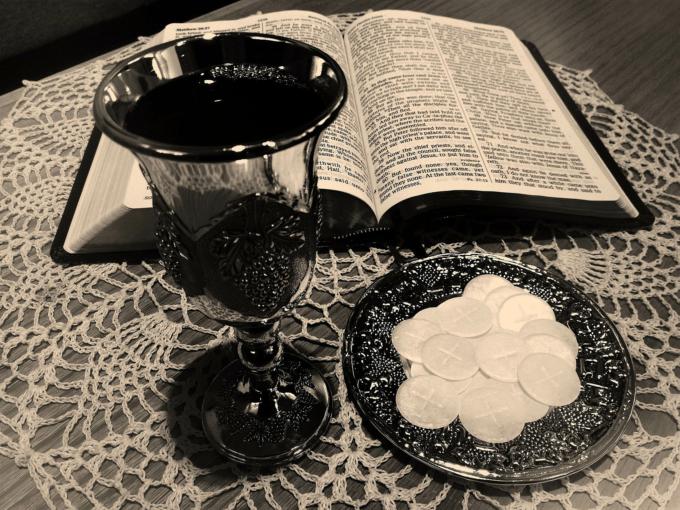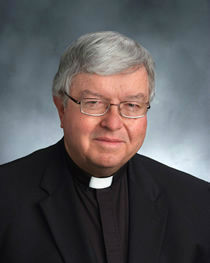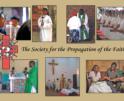
Faith
Since both the bread and the chalice were given to the disciples at the Last Supper, "sharing in both eucharistic species reflects more fully the sacred realities that the liturgy signifies"

Doyle
Q. My friend told me that in her parish, which is a large one, only one section of the church is offered the blood of Christ. Her pastor believes that adding more eucharistic ministers would create a traffic jam. If they are going to distribute holy Communion from the chalice, shouldn't all be given the opportunity? (Henderson, Nevada)
Q. We moved recently to Texas from Georgia and found a Catholic parish near our new home. We noticed, though, that holy Communion is not received from the cup. When we asked about it, we were told that it is a "training issue" and unlikely to change.
As a retired military family, we have traveled throughout the U.S. and have never encountered a Mass where the precious blood was not offered. I know that not everyone chooses to partake, but I thought it was an integral part of the Mass. Is this something that can be decided by the individual parish? (Houston)
A. In 2002, the U.S. Catholic bishops issued a document titled "Norms for the Distribution and Reception of Holy Communion under Both Kinds."
In it is expressed a clear preference for the availability of the Eucharist under the forms of both bread and wine. Since both the bread and the chalice were given to the disciples at the Last Supper, "sharing in both eucharistic species reflects more fully the sacred realities that the liturgy signifies" (No. 11).
The bishops note that Communion under both species was standard practice for at least the first thousand years of the church's history. As to the occasions on which both species are now to be available, the norms leave that determination up to local bishops and, in the absence of any general diocesan guidelines, to the pastor of a parish.
The norms and the General Instruction of the Roman Missal highlight that the Eucharist must always be distributed in an orderly and reverent manner and that care should be taken to ensure that "there is no danger of profanation of the sacrament or of the rite's becoming difficult because of the number of participants" (GIRM, No. 283).
The norms do make it clear that the distribution under both species is not a mandatory part of the eucharistic celebration and that Christ is fully present when received under the species of the bread or of the wine alone, noting that some communicants may be able to receive one species only because of illness and that the whole church receives only the host in the Good Friday liturgy.
My own experience leads me to believe that most parishes in the U.S. make both species available at most liturgies.
As to the specific concerns expressed in the two letters above, I would think that the "training issue" is far from insurmountable and that the necessary spiritual and practical preparation can often be handled in a single two-hour workshop; and that the opportunity to receive under both species, when offered, should in fact be made available to the entire congregation.
Q. My wife and I are seniors, over 70 years of age, and we abstain from eating meat on Fridays during Lent. But some of our fellow parishioners who are our contemporaries say that the rules for fast and abstinence don't apply at our age.
I checked the Code of Canon Law and it seems to leave it up to national conferences of bishops. So what are the rules for the United States? (Albany, New York)
A. You and your wife have to abstain from meat, but you don't have to fast. The norms concerning abstinence on the Fridays of Lent are binding on Latin-rite Catholics from age 14 onward.
But the laws concerning fasting on Ash Wednesday and Good Friday -- one full meatless meal; some food at other regular meal times but, when combined, equal to less than a full meal -- govern only those from age 18 until age 59.
The U.S. bishops do note in their "Questions and Answers About Lent and Lenten Practices" that "in all cases, common sense should prevail, and ill persons should not further jeopardize their health by fasting."
- Father Kenneth Doyle is a columnist for Catholic News Service
Recent articles in the Faith & Family section
-
Did you know?Father Robert M. O'Grady
-
Sowing the Seeds of FaithMaureen Crowley Heil
-
Bread left overScott Hahn
-
Scripture Reflection for July 28, 2024, Seventeenth Sunday in Ordinary TimeJem Sullivan
-
What the universal call to holiness entailsDr. R. Jared Staudt


















